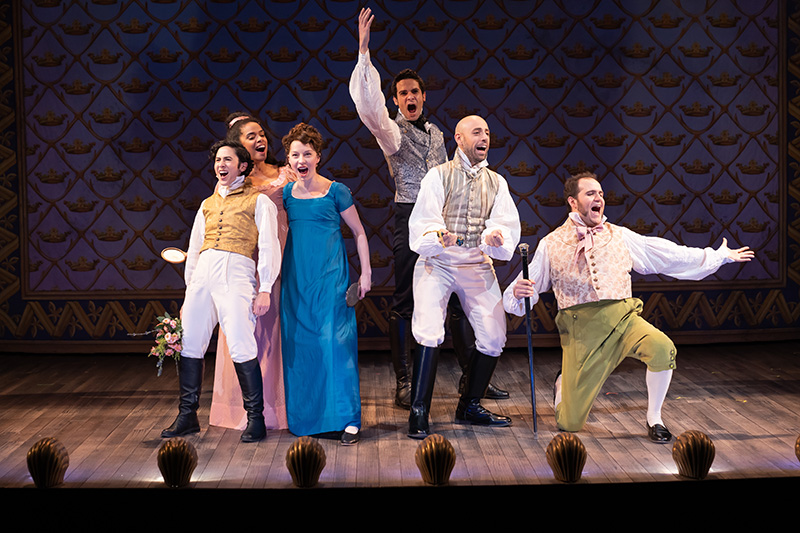William Makepeace Thackeray’s “Vanity Fair” is best known as an 800-page gorilla of a novel, but the episodic tale of social-climbing young Englishwoman Becky Sharp’s adventures among the aristocrats was originally published as a monthly serial by the humor magazine Punch. The installments were subtitled “pen and pencil sketches of English society” and at its best, the stage adaptation by Kate Hamill—in which the story is told by a tatty nineteenth century music hall troupe—is delightfully sketchy, in every sense of the word.

There’s plenty of unsavory behavior on display in this American Conservatory Theater co-production with Washington, D.C.’s Shakespeare Theatre Company, including a mercenary marriage, neglect of small children, compulsive gambling and all manner of conniving for cash and finery. It’s all drawn quickly and broadly, in a series of set pieces directed with fleet-footed verve by Jessica Stone, greatly aided by Alexander Dodge’s charming Victorian-vaudeville scenic design, with its quick-dropping background flats and a wonderful crank-driven contraption that pulls a giant scroll of illustrations one-by-one through a frame to indicate location changes. And in terms of sketch comedy, with much of the cast playing multiple characters from one scene to the next, there are moments of the sublime:
Vincent Randazzo is a hoot as Jos Sedley, the Tweedledumpy brother of poor Becky Sharp’s wealthy boarding school pal Amelia (Maribel Martinez). Dopily oblivious when Becky (Rebekah Brockman) puts the moves on him, her sights set on the family fortune. Jos is a shy manchild, speaking in monosyllabic babytalk, his chin perpetually tucked into his high collar. After a quick change for the following scene, he’s back as slothful Sir Crawley, an oleaginous personification of the idle rich, calling to mind a creepier Meatloaf in a limp pageboy. Jennifer Moeller’s costumes and wigs manage to simultaneously convey the finery of the elites being satirized and the modest budget of the burlesque players doing the satirizing.

Dan Hiatt, too, is a double delight in his most substantial roles. As the company manager and narrator, he offers winking commentary on the audience, wondering which members of the crowd have been unwillingly dragged to the theater by their spouses and singling out a likely napper, predicting a bout of disruptive snoring. But Hiatt lifts the show to its greatest comic heights when, kitted out in a pink-ribboned bonnet and ruffled dress, he assumes the role of society doyenne Miss Matilda Crawley, who briefly takes Becky under her wing. And, gentle reader, there is wind beneath that wing, as revealed in a fusillade of flatulence gags.
There’s a cheerful ribaldry to most every scene in “Vanity Fair.” But there are more than two hours of such scenes in this production, and their sum doesn’t offer much more than each part.
As Becky and Amelia, Brockman and Martinez, are the only cast members who play single roles throughout and their evolving friendship is intended to serve as a narrative throughline. But to a large degree, the strategy backfires. The pair’s consistent, relatively straightforward performances are overshadowed by the attention-grabbing quick changes and broad-stroked caricatures that surround them.
Brockman makes as much as she can from a knowing eyeroll here, a crooked smirk there, but her slyness is recessive amidst the surrounding buffoonery. Becky Sharp is supposed to be the protagonist of this story, but in contrast to her surname she moves through this picaresque as a bit of a blur.
Playwright Hamill’s “Vanity Fair” amusingly pounds the upper crust into crumbs. But, as in sketch comedy, there’s a surplus of silliness and little sense of stakes. The public fell in love with Thackeray’s version when it was published in brief installments. That’s not a particularly feasible way to present a stage production, but one can see how this material might benefit from the approach.
